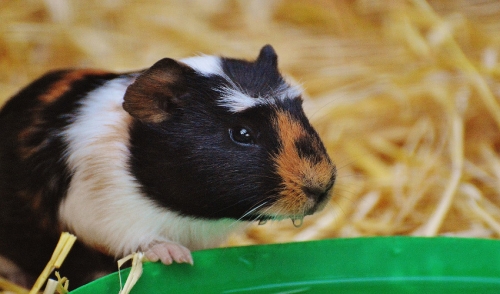
Exercise Ideas for Guinea Pigs
Guinea pigs are fun and popular pets with their friendly and affectionate natures, cute expressions and easy care needs. Most guinea pigs are kept in cages and offered nutritious healthy diets, but no matter how spacious the cage or how well-balanced the diet may be, proper exercise is still essential for a guinea pig's health and well-being.
Why Guinea Pigs Need Exercise
Guinea pigs are rodents that have adapted to constantly forage for scraps of food and evade dangerous predators, but our pampered pet guinea pigs don't get nearly as much exercise as their wild cousins because that food is provided to them and predators are kept away. Without exercise, however, it is easy for a guinea pig to gain excess weight and suffer obesity problems, including arthritis, heart disease, diabetes and other complications. Regular exercise can help reduce those risks, and will keep a guinea pig limber and toned, with improved circulation, respiration, digestion and overall good health for a longer life. Exercise also helps work off excess energy and reduce stress and anxiety, helping that longer life be a happier one at the same time.
In-Cage Exercise
In a large cage, guinea pigs have plenty of room to run, explore and play, but there are easy ways to encourage guinea pigs to exercise even more. These are curious, intelligent creatures that will investigate every corner of their domain, and adding tunnels, caves and similar structures will entice the guinea pigs to move around more. Deeper bedding will provide more digging and rooting space as well. Adding new toys to the cage will encourage more entertainment and exploration, but be sure to rotate toys regularly to continually provide more stimulation.
The Fun of Free Range Exercise
Exercising outside the cage is ideal for guinea pigs and provides much more space with a wider range of enrichment opportunities than any cage can offer. Free range time may be either indoors in a safe room or hallway, or can be arranged outside in a comfortable pen or run. To keep guinea pigs safe, however, it is important to…
- Keep the exercise area is free of hazards, such as cords or wires that might get chewed on, tight holes where a guinea pig could get stuck or any toxic plants that could be poisonous.
- Provide plenty of clean, fresh water in an easily accessible dish at all times, as well as providing some food for hungry guinea pigs to snack on as they burn off energy while exercising.
- Supervise free ranging guinea pigs at all times to protect them from any pets or wildlife, unsafe conditions or potential accidents that could cause injuries.
- Provide fun but safe games for loose guinea pigs to play, such as hiding vegetable chunks or other edible treats for them to find, or offering tunnels or dens to play in.
- Never put guinea pigs in any area that has been recently treated with heavy chemicals, such as carpet shampoo, fresh paint, insecticides, pesticides or chemical fertilizers.
- Always be mindful of the temperature so guinea pigs are not too hot or too cold. Avoid using pens or runs in direct sunlight or indoor areas exposed to strong air conditioning vents or heating ducts.
Ideally, a guinea pig will enjoy 3-4 hours of free range play time each day, especially if their cage habitat is small. Even with a big cage, however, it is important to provide adequate exercise out of the cage, and guinea pigs that can get these good workouts will be happier, healthier and better adjusted.
